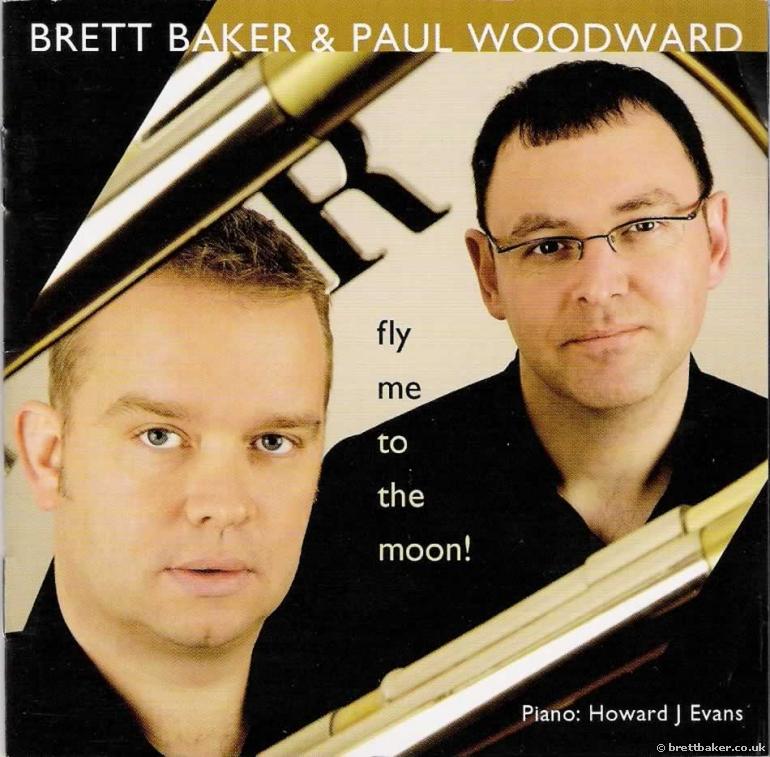
Fly me to the Moon – Peter Bale
Featuring Solos by Brett Baker and Paul Woodward accomapnied by Howard Evans and the Black Dyke Trombone Quartet

The latest recording in Brett Baker's extensive discography sees him sharing solos and duets with Paul Woodward, his co-principal at Black Dyke, with piano accompaniment provided by Howard Evans.
They are joined by their colleagues Gary Reed and Adrian Hirst for a couple of items, with percussion support from Lee Skipsey on one track, whilst the disc closes with an arrangement for trombone choir of the “Finale from the Organ Symphony” (Camille Saint-Saens).
The recording opens with a clever transcription by Derek Bishop of Les Condon's march “Celebration” which captures well the spirit of the music, and manages to include most of the salient features, although the single trombone on the countermelody in the majestic final section cannot quite replace the sound of a full bench of solo cornets!
Several other items are drawn from Salvation Army repertoire, including the duets “We shall Win” (H W Glazier) and “Glorious Fountain” (George Marshall). The pairings of Brett with Paul Woodward and Garry Reed respectively are well balanced, both in the answering phrases and in the passages in thirds or sixths.
There are three solos taken from an album published by the USA Eastern Territory: “Now I Belong to Jesus”, “The Wonder of His Grace” and “Covenant”, arranged by Bruce Broughton, Ivor Bosanko and Thomas Mack respectively.
Paul Woodward brings out the lyrical nature of the music, aided by Howard's sympathetic accompaniments. “A Never Failing Friend” (Erik Leidzen) was the first theme and variation solo for trombone published by the Salvation Army, and although released back in 1934 it still sounds fresh. From the opening recitative onwards, Paul's interpretation is authoritative, with steady tempos allowing plenty of space for the music to breathe.
Little is known about “The Conqueror” (Jacques Lafont), which Brett Baker came across whilst going through some old music in Melbourne.
Coping admirably with the work's many challenges, Brett proves a powerful advocate for what should be a valuable addition to the repertoire. Of more recent vintage is the unaccompanied duet “Trombone Institute of Technology” (Miles Davis), for which Brett is joined by Adrian Hirst on bass trombone. Both players seem quite comfortable with the angular lines and syncopated rhythms of this jazz-influenced work, which was also recorded by Nick Hudson and Doug Yeo on their cd “Two of a Mind”.
Unlike the other brass instruments, which have undergone various developments over the years, the trombone has changed relatively little, apart from the addition of the thumb valve with the extra options that affords.
The German baroque composer Georg Telemann would have recognised the modern instrument, although his “Concerto @ 4” was certainly never intended to be played on four trombones. The performance is surprisingly effective, however, with crisp articulation and well blended voices.
Saverio Mercadante was a contemporary of, and influence on, Verdi. The aria “Salve Maria” was first recorded in a version for trombone and piano by Christian Lindberg, and the interpretation here is a reminder that the trombone has often been seen as a noble instrument.
The lighter end of the repertoire is represented by “The Summer Knows” (Michel Legrande arr Barry), which was originally prepared for Ian Bousfield to play with the Yorkshire Imperial Band.
The piano transcription by Michael Hopkinson is faithful to the original band version, and exploits the silky sound of the upper register of the instrument. Two of the quartets could also be said to celebrate the trombone's links with the world of popular music, with “Gospel Time” and the title track, “Fly Me to the Moon”, allowing the players to let their hair down a little.
They are joined in the former by Black Dyke's Lee Skipsey on percussion, whilst the latter, which was apparently recorded as a late addition when they found they had time to spare at the end of the session, is one of the highlights of the recording. “Gospel Time” features several quasi-improvised solos which sound quite spontaneous, whilst “Fly Me to the Moon” has a nicely laid-back feel to it, the rhythmic pulse being firmly established but never too prominent, the clever arrangement frequently giving the impression that there are more than four parts being played.
The other quartet item is a transcription by Derek Parker of Sir John Stainer's anthem “God so Loved the World”, from “The Crucifixion”. They produce a very refined reading, eschewing unnecessary drama in favour of a smooth, restrained performance, with even the climax being tightly controlled.
John Challis's transcription of the Saint-Saens has become a popular item at trombone gatherings around the world.
Recorded at the end of a British Trombone Society day at the Royal Northern College in Manchester, the trombone choir includes members from a number of top bands. There are no details of the numbers of players, or the instruments used, but it would seem to include alto and contrabass trombones, in addition to tenor and bass.
They produce a powerful sound when required, but also play with some delicacy, whilst some of the bass lines are quite remarkable, particularly when emulating the organ's pedals. There is a little untidiness in the busy final section, but it does little to detract from what is an excellent finale to a first-rate recording.
The sleeve notes reveal a great affection for the music included, and it certainly seems as if the players enjoyed working together. Howard Evans is a most sensitive accompanist, supporting the soloists and duettists without becoming over-prominent, and contributes much to the success of the recording.
Peter Bale – 4barsrest


